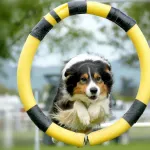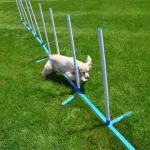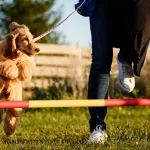Training tips
Puppy Socialization Sessions: The Key to a Well-Behaved Dog

The early stages of a puppy’s life are a window of opportunity to shape their behavior, temperament, and how they interact with people, other dogs, and their environment.
Puppy socialization is one of the most crucial steps in raising a happy, confident, and well-adjusted dog. The early stages of a puppy’s life are a window of opportunity to shape their behavior, temperament, and how they interact with people, other dogs, and their environment. If you are wondering when to start training a puppy or looking for affordable puppy training near me, structured puppy socialization sessions can provide the perfect foundation.
In this blog, we will explore the importance of puppy socialization, highlight useful techniques like leash training a puppy and crate training a puppy, and discuss how to potty train a puppy effectively. With guidance from professional puppy dog training programs, you can ensure your furry companion grows into a well-behaved and happy member of your family. For residents seeking puppy obedience training near me, Calidognia offers expert solutions to support you at every stage.
Why Puppy Socialization Matters
Puppy socialization is the process of exposing your puppy to a variety of people, animals, sights, sounds, and experiences in a positive and controlled way. Socialization helps puppies develop confidence, reduces anxiety, and prevents behavioral issues later in life. Puppies that miss out on this essential training period often grow into fearful or aggressive adult dogs.
Experts recommend starting socialization early—as soon as you bring your puppy home, usually between 8 to 16 weeks of age. This critical period allows puppies to adapt to new experiences with curiosity rather than fear.
Benefits of Puppy Socialization:
- Reduces fear and anxiety around unfamiliar situations.
- Encourages positive interactions with people and animals.
- Prevents aggressive behavior or reactivity.
- Builds trust and confidence.
- Enhances the puppy’s ability to handle different environments.
If you’re searching for class puppy training or affordable puppy training near me, consider professional sessions led by skilled trainers like those at Calidognia.
Techniques for Successful Puppy Socialization
1. Crate Training a Puppy
Crate training is a valuable tool for house training, providing a safe space for your puppy, and teaching boundaries. Puppies naturally seek a den-like environment, and a crate mimics that cozy, secure space.
Tips for Crate Training a Puppy:
- Start with short crate sessions and gradually increase the duration.
- Place comfortable bedding and their favorite toys inside the crate.
- Use treats and praise to create a positive association with the crate.
- Never use the crate as punishment.
Crate training can help with how long to house train a puppy since it teaches them to hold their bladder until they are let outside.
2. How to Potty Train a Puppy
House training can be one of the most challenging aspects of raising a puppy. With consistency, patience, and positive reinforcement, you can master how to potty train a puppy in no time.
Steps to Potty Train a Puppy:
- Take your puppy outside frequently—after meals, naps, and playtime.
- Establish a consistent bathroom schedule.
- Praise and reward your puppy with the best puppy training treats when they eliminate outside.
- Use verbal cues like “go potty” to reinforce bathroom behavior.
- Avoid punishing accidents—focus on positive reinforcement instead.
If you are wondering how long to house train a puppy, most puppies learn within 4-6 months with proper consistency.
3. Leash Training a Puppy
Walking on a leash is a fundamental skill for any dog, and leash training a puppy early ensures enjoyable walks for years to come.
Tips for Leash Training:
- Start indoors with a lightweight leash and collar.
- Use treats and praise to encourage your puppy to walk by your side.
- Gradually introduce outdoor walks with minimal distractions.
- Redirect your puppy if they pull on the leash, and reward them for walking calmly.
Searching for a puppy trainer near me can provide personalized support for leash training and other essential skills.
4. Puppy Obedience Training
Puppy obedience training lays the groundwork for good manners and behavior. From learning basic commands like sit, stay, and come to more advanced skills, obedience training is a must for all puppies.
Key Elements of Puppy Obedience Training:
- Use treat training a puppy to reinforce positive behaviors.
- Keep training sessions short and engaging (5-10 minutes).
- Practice commands in various environments to generalize behavior.
- Avoid harsh corrections—focus on positive reinforcement and patience.
If you are looking for puppy obedience training near me, professional trainers at Calidognia offer tailored programs to meet your puppy’s needs.
When to Start Training a Puppy
Puppies can start basic training as early as 8 weeks old. Early training sessions help them develop focus, discipline, and strong bonds with their owners. Whether it’s crate training a puppy, how to potty train a puppy, or basic obedience, starting early ensures faster and more lasting results.
Choosing the Best Puppy Training Treats
Treats are a powerful motivator during training sessions. The best puppy training treats are small, soft, and highly palatable. Look for treats that are healthy, low in calories, and made with natural ingredients.
Tips for Using Treats:
- Use treats only during training to keep them special.
- Pair treats with verbal praise for a stronger reward system.
- Gradually reduce treat frequency as your puppy masters commands.
Why Professional Puppy Socialization is Essential
While you can begin socialization and training at home, professional classes offer several advantages:
- Exposure to other puppies and controlled environments.
- Guidance from experienced trainers.
- Structured training to build consistent behaviors.
- Opportunities to address specific concerns, such as leash training a puppy or crate training a puppy.
If you’re searching for affordable puppy training near me or class puppy training, Calidognia provides specialized puppy socialization sessions tailored to your pet’s unique needs.
Finding a Puppy Trainer Near Me
Choosing the right trainer can make a significant difference in your puppy’s development. A professional trainer understands puppy behavior and uses positive reinforcement techniques to create a fun and effective learning experience.
At Calidognia, we pride ourselves on offering top-notch puppy training services, including obedience training, leash training, and socialization classes. Our affordable puppy training programs are designed to help you and your furry friend succeed.
Puppy socialization sessions are the cornerstone of raising a happy, confident, and well-mannered dog. Whether you are learning how to potty train a puppy, exploring treat training a puppy, or searching for puppy obedience training near me, investing in early training pays off for a lifetime.
If you’re looking for the best guidance and support for your puppy, Calidognia is here to help. Our experienced trainers offer personalized training programs, ensuring your puppy gets the skills they need to thrive.
Contact us today to learn more about our puppy socialization sessions and start your puppy’s journey toward becoming the perfect companion!




